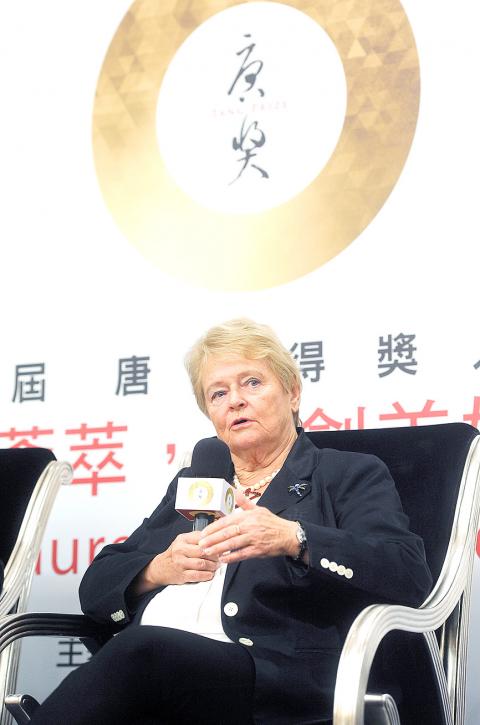Former Norwegian prime minister Gro Harlem Brundtland, the winner of the first Tang Prize in Sustainable Development, on Friday said that nuclear power is not her preferred source of new energy due to the complexities involved.
Brundtland, who chaired the World Commission on Environment and Development (WCED) from 1984 to 1987, said the assessment and analysis of nuclear energy was one of the most difficult issues to agree on among the members of the commission.
“In the end, having analyzed and described the risks and potential of nuclear energy, we agreed on a conclusion that nuclear energy in the future is only sustainable and acceptable if the still-unsolved problems with regard to storage of the waste have been solved,” she said at a press conference in Taipei in response to questions on her views about Taiwan’s nuclear controversy.

Photo: Fang Pin-chao, Taipei Times
Brundtland said that nuclear power needs to be made safer because it still accounts for about 20 percent of the energy use in the world.
It means that any government responsible for nuclear energy, or planning to adopt nuclear energy, has to take that responsibility seriously, she said.
Given that countries cannot immediately stop using nuclear power, they are advised to move toward solar energy, renewable energy and other solutions while gradually reducing the use of fossil fuels, Brundtland said.
She said that although nuclear power could become safer in the future, it is not her “preferred new energy source” because she thinks it entails too many complexities.
The question was raised at the press conference in view of an ongoing controversy about the construction of the Fourth Nuclear Power Plant in New Taipei City’s Gongliao District (貢寮) amid public concerns over safety.
The Fourth Nuclear Power Plant project began in 1999 and is near completion, but the fuel rods have not yet been installed due to widespread opposition to nuclear power. The plant is located in New Taipei City, Taiwan’s most populous municipality.
Meanwhile, when speaking at a forum at Greater Kaohsiung’s National Sun Yat-sen University on Wednesday as part of a week of lectures and other activities in celebration of the first Tang Prize, she said the world is facing the challenge of transforming itself into a green economy.
However, she said there was a problem with tax systems, saying that the richest should be more heavily taxed and that subsidies for chemical fuels should be scrapped.
She said Taiwan has a big problem of low taxation and urged the implementation of a more reasonable tax system.
Brundtland, the “godmother of sustainable development,” was awarded the first Tang Prize in Sustainable Development on Thursday for her work in the sector.
The 1987 “Brundtland Report” by the WCED laid the groundwork for the 1992 Earth Summit in Rio de Janeiro, Brazil, which produced a global action plan for sustainable development known as Agenda 21 and initiated the UN Framework Convention on Climate Change, the lead-up to the 1997 Kyoto Protocol.
The report defined the term “sustainable development” as “development that meets the needs of the present without compromising the ability of future generations to meet their own needs.”
The concept supports economic and social development, while highlighting the importance of protecting the environment and natural resources.

Foreign travelers entering Taiwan on a short layover via Taiwan Taoyuan International Airport are receiving NT$600 gift vouchers from yesterday, the Tourism Administration said, adding that it hopes the incentive would boost tourism consumption at the airport. The program, which allows travelers holding non-Taiwan passports who enter the country during a layover of up to 24 hours to claim a voucher, aims to promote attractions at the airport, the agency said in a statement on Friday. To participate, travelers must sign up on the campaign Web site, the agency said. They can then present their passport and boarding pass for their connecting international

Temperatures in northern Taiwan are forecast to reach as high as 30°C today, as an ongoing northeasterly seasonal wind system weakens, the Central Weather Administration (CWA) said. CWA forecaster Tseng Chao-cheng (曾昭誠) said yesterday that with the seasonal wind system weakening, warmer easterly winds would boost the temperature today. Daytime temperatures in northern Taiwan and Yilan County are expected to range from 28°C to 30°C today, up about 3°C from yesterday, Tseng said. According to the CWA, temperature highs in central and southern Taiwan could stay stable. However, the weather is expected to turn cooler starting tonight as the northeasterly wind system strengthens again

COOLING OFF: Temperatures are expected to fall to lows of about 20°C on Sunday and possibly 18°C to 19°C next week, following a wave of northeasterly winds on Friday The Central Weather Administration (CWA) on Sunday forecast more rain and cooler temperatures for northern Taiwan this week, with the mercury dropping to lows of 18°C, as another wave of northeasterly winds sweeps across the country. The current northeasterly winds would continue to affect Taiwan through today, with precipitation peaking today, bringing increased rainfall to windward areas, CWA forecaster Liu Pei-teng (劉沛滕) said. The weather system would weaken slightly tomorrow before another, stronger wave arrives on Friday, lasting into next week, Liu said. From yesterday to today, northern Taiwan can expect cool, wet weather, with lows of 22°C to 23°C in most areas,

Three Taiwanese airlines have prohibited passengers from packing Bluetooth earbuds and their charger cases in checked luggage. EVA Air and Uni Air said that Bluetooth earbuds and charger cases are categorized as portable electronic devices, which should be switched off if they are placed in checked luggage based on international aviation safety regulations. They must not be in standby or sleep mode. However, as charging would continue when earbuds are placed in the charger cases, which would contravene international aviation regulations, their cases must be carried as hand luggage, they said. Tigerair Taiwan said that earbud charger cases are equipped